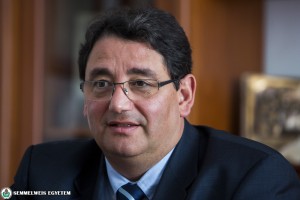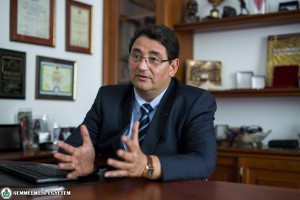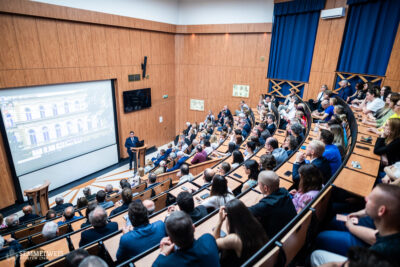By the end of December all clinics will have to prepare a stabilisation and development programme with the help of the Clinical Centre. Dr. Béla Merkely, Vice-Rector for Clinical Affairs, President of the Clinical Centre and Director of the Heart and Vascular Centre said that the Centre’s executive committee will visit each and every clinic. The Clinical Centre’s operation and organisation have recently been rearranged, which enables the Vice-Rector for Clinical Affairs to actively manage and lead the organisation of patient care.
 Dr. Béla Merkely considers progressivity and acute patient care the key factors of healthcare. One of the Clinical Centre’s priority responsibilities is to provide the highest quality services at every department of the university. The new president of the Centre said that the ultimate goal is to create stable, reliable and progressive institutions that operate with a professional and knowledgeable staff delivering continuous and quality patient care. In his opinion the Clinical Centre’s role is to make clinics and departments competitive.
Dr. Béla Merkely considers progressivity and acute patient care the key factors of healthcare. One of the Clinical Centre’s priority responsibilities is to provide the highest quality services at every department of the university. The new president of the Centre said that the ultimate goal is to create stable, reliable and progressive institutions that operate with a professional and knowledgeable staff delivering continuous and quality patient care. In his opinion the Clinical Centre’s role is to make clinics and departments competitive.
The new president believes that clinics should start reforming their polyclinic structures by adapting a more specialised approach towards patient care. All specialised areas have to be represented at the university in order to provide comprehensive education, however every clinic should have a specialised area that provides the highest quality services not only regionally but nation-wide as well. While designing the clinical portfolios, services such as stroke treatment, the treatment of certain hematologic and acute gastroenterological diseases and the management of polytraumatised patients should be included to the greatest extent.
Dr. Merkely Béla said that the executive committee of the Clinical Centre is a new university body whose members are appointed by the president and approved by the rector. The board has seven members, where the director of the Department of Anaesthesiology and Intensive Therapy and the university’s chief pharmacist are standing members. The other five members of the board are Dr. Nándor Ács, director of the 2nd Department of Obstetrics and Gynaecology, Dr. Péter Nyirády, director of the Department of Urology, Dr. Attila Szabó, director of the 1st Department of Paediatrics, Dr. László Tamás, director of the Department of Otorhinolaryngology, Head and Neck Surgery and Dr. Eszter Sinkó, vice-dean of the Faculty of Health and Public Administration. The Clinical Centre’s Advisory Board assists the executive committee in presenting its proposals to the deans and the chancellor. The director of the Clinical Centre will be Dr. Sándor Valent and both the Rector and the Chancellor will take part in its management.
 The executive committee will visit all departments and clinics, will review their portfolios, expenditures, incomes and the possible changes in their structures. Dr. Béla Merkely pointed out that the stabilisation and development plans for all institutions have to be prepared by the end of the year in order to have a clear view on how Semmelweis University’s patient care can be managed in the most cost efficient way, while fulfilling the needs of patients and providing the highest quality possible. He believes that rationalisation and structural changes will result in the development of Semmelweis University and its departments.
The executive committee will visit all departments and clinics, will review their portfolios, expenditures, incomes and the possible changes in their structures. Dr. Béla Merkely pointed out that the stabilisation and development plans for all institutions have to be prepared by the end of the year in order to have a clear view on how Semmelweis University’s patient care can be managed in the most cost efficient way, while fulfilling the needs of patients and providing the highest quality possible. He believes that rationalisation and structural changes will result in the development of Semmelweis University and its departments.
The optimal operation of the healthcare institutions’ network is also inevitable in maintaining the quality of education, as the practical approach to medical education is becoming more and more prominent. Therefore, clinics and departments need to undergo capacity development to be able to provide training sites for medical students.
According to the president of the Clinical Centre all services need to be made available at Semmelweis University. Thanks to the Korányi project, separate departments of traumatology and intensive care will be realised in the near future. He also encourages the establishment of a centralised and efficient unit in the field of oncology.
Dr. Béla Merkely does not think that there are any expenses that need to be cut down on, because cost efficiency can be achieved by structural reforms and by keeping track of incomes. He also said that the management of the Clinical Centre should be done by coordinated teamwork and it should serve the healthcare system as a whole by adapting to the prevailing situation.
Pálma Dobozi
Photo: Gábor Ancsin
Translated by: Ágnes Raubinek


